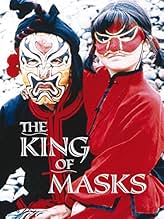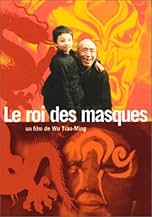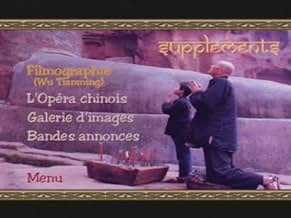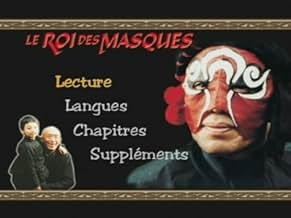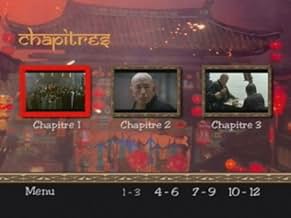IMDb-BEWERTUNG
7,7/10
3562
IHRE BEWERTUNG
Füge eine Handlung in deiner Sprache hinzuIn a remote area of China, in the 1930s, a street performer named Wang practices the change-mask opera art of bian lian. Seeking to pass his art, Wang buys what he believes to be an orphan b... Alles lesenIn a remote area of China, in the 1930s, a street performer named Wang practices the change-mask opera art of bian lian. Seeking to pass his art, Wang buys what he believes to be an orphan boy, but quickly learns his new disciple's secret.In a remote area of China, in the 1930s, a street performer named Wang practices the change-mask opera art of bian lian. Seeking to pass his art, Wang buys what he believes to be an orphan boy, but quickly learns his new disciple's secret.
- Auszeichnungen
- 21 Gewinne & 5 Nominierungen insgesamt
Empfohlene Bewertungen
The theme of this film is tradition, which can be a good thing when it preserves continuity across generational lines, but harsh and restrictive when it allows no room for growth. Ironically, the skill of the "grandpa" is in surprising his audience with masks that are ever changing, yet change is the one thing he finds hardest to do. Tradition requires that his skills can only be passed down to a male heir, and hence he would sooner allow his skills to be lost than to break with that tradition. The message he ultimately has to learn is that tradition can sometimes be wrong, and that even he can be surprised by the unexpected mask.
This is a Chinese film, in which we are given the Chinese perspective, but the message is universal. On another level, consider the Christian perspective. Metaphorically speaking, what if Jesus came back wearing the mask of a little girl? Would that representation be rejected on the grounds that it wasn't what they were expecting? Would they reject the mask, and thus miss the message? Or consider the Aztecs of Mexico, who fell victim to the Conquistadors, because Cortez resembled what they thought was the return of their god Quetzalcoatl? Beliefs about traditions can not only be wrong, but potentially enslaving. When we become so blinded by tradition that we can see no room for change, change may have no room for us!
This is a marvelous film, which begs to be compared with "Whale Rider" (2002), having a similar theme but presented from the perspective of a New Zealand Maori tribe. They, too, had a tradition in which the mask of the leader could only be worn by a male, and when a male could not be found, would sooner the tradition die than change. The point of these stories, of course, is not the girl, but the change. There is more to value than gender. When tradition can only accept the one, it might be surprised by the other.
This is a Chinese film, in which we are given the Chinese perspective, but the message is universal. On another level, consider the Christian perspective. Metaphorically speaking, what if Jesus came back wearing the mask of a little girl? Would that representation be rejected on the grounds that it wasn't what they were expecting? Would they reject the mask, and thus miss the message? Or consider the Aztecs of Mexico, who fell victim to the Conquistadors, because Cortez resembled what they thought was the return of their god Quetzalcoatl? Beliefs about traditions can not only be wrong, but potentially enslaving. When we become so blinded by tradition that we can see no room for change, change may have no room for us!
This is a marvelous film, which begs to be compared with "Whale Rider" (2002), having a similar theme but presented from the perspective of a New Zealand Maori tribe. They, too, had a tradition in which the mask of the leader could only be worn by a male, and when a male could not be found, would sooner the tradition die than change. The point of these stories, of course, is not the girl, but the change. There is more to value than gender. When tradition can only accept the one, it might be surprised by the other.
10pyotr-3
This spectacular film is one of the most amazing movies I have ever seen. It shows a China I had never seen or imagined, and I believe it shows 1930's China in the most REAL light ever seen in a movie. It is absolutely heart-breaking in so many situations, seeing how hard life was for the characters, and yet the story and the ending are incredibly joyful. You truly see the depths and heigths of human existence in this film. The actors are all perfect, such that you feel like you have really entered a different world.
I simply can not recommend this movie highly enough. It may just change you forever once you have seen it.
I simply can not recommend this movie highly enough. It may just change you forever once you have seen it.
I enjoyed the cinematographic recreation of China in the 1930s in this beautiful film. The story is simple. An older male performer wants to pass on his art to a young man although he has no living children. The faces of the actors are marvelous to see. The story reveals the devotion and gratitude of children to those who treat them well and their longing to be treated well. The operas in the film remind me of FAREWELL MY CONCUBINE, which was more sophisticated and intricate. The story here reminds me of a Dickens tale of days when children were almost chattel. The plot is a bit predictable and a bit too sentimental for me but well worth the time to view for the heroism, humanity, and history portrayed.
"The world is a cold place, but we can bring warmth to it." - Master Liang
Predictable, manipulative, and emotional? Yes, but if you still have a heart that beats, you may find Wu Tianming's 1996 film, The King of Masks, to be a moving and memorable experience. Beautifully photographed in gorgeous color, the film tells the story of Wang Bianlian, a lonely old street performer with rotting teeth who lives in a houseboat on the Yangtze and is a master of the art of "face-changing". This involves putting on and taking off silk masks in the flash of a second so that the process is almost invisible to the eye. In the highly patriarchal society of the 1930s, this sort of magic could only be performed by a male; therefore, Wang, abandoned by his wife and children many years ago, must now find a boy to carry on his tradition or it will die forever.
When a famous transgender opera performer called the Living Bodhisattva, Master Liang (Zhao Zhigang) offers him a job in his acting troupe, Wang declines and decides he must find his own "grandson" to pass down his gift to. Thinking "she" is a "he", Wang goes to a slave auction and buys a sad eyed little eight-year old for $5 in a dark alley. He calls her "Doggie" (Zhou Renying) and takes his new companion to live with him and his beautiful monkey "General" (who comes close to stealing the show). When Wang accidentally discovers that Doggie is a girl, he is ready to cast her out, but having been sold seven times previously, she begs to stay.
Xu Zhu, an outstanding actor in the Beijing People's Artistic Theater, portrays Wang as a man still operating within the rules of society but one who is full of kindness and good humor. Out of compassion, the old man agrees not to teach Doggie the art of masking but allows her to stay as a servant and to learn acrobatics to perform in his act. Both social outcasts, the two form a friendship based on mutual need and longing. Cutting to scenes from a Chinese opera, Attaining Nirvana, attended by Wang and Doggie, in which a princess, upset over her father's suffering, vows to find and comfort him in the underworld. Sacrificing herself, she becomes a Bodhisattva. This mirrors the emotional pivot of the film when Doggie, now lovingly devoted to "Grandpa" (whom she must call "Boss"), is willing to sacrifice herself to help him when he is in serious trouble with the authorities. King of Masks is a work of warmth and tenderness, yet is also an indictment of the emotional harm caused by gender preference in society. Zhou (Doggie) is so real in expressing her feelings of being unloved and unworthy that her performance is truly radiant (she is an orphan who performs acrobatics in real life).
One of the most poignant moments in the film occurs when Doggie picks up a statue of a Bodhisattva and asks Wang, "you worship her, don't you?" Tianming, who returned to China in 1995 after a prolonged absence, stated: "I wanted to make this film", he said, "because I fear that society is forgetting our Chinese traditions. Those traditions emphasized the value of morality and ethics, proper manners, a sense of honor, and taking care of each other Through this story of an old man and a child in a world full of struggle and suffering, I wanted to express the importance of love." He has succeeded far beyond his expectations and, in the process, has elevated us to a new level of understanding and compassion.
Predictable, manipulative, and emotional? Yes, but if you still have a heart that beats, you may find Wu Tianming's 1996 film, The King of Masks, to be a moving and memorable experience. Beautifully photographed in gorgeous color, the film tells the story of Wang Bianlian, a lonely old street performer with rotting teeth who lives in a houseboat on the Yangtze and is a master of the art of "face-changing". This involves putting on and taking off silk masks in the flash of a second so that the process is almost invisible to the eye. In the highly patriarchal society of the 1930s, this sort of magic could only be performed by a male; therefore, Wang, abandoned by his wife and children many years ago, must now find a boy to carry on his tradition or it will die forever.
When a famous transgender opera performer called the Living Bodhisattva, Master Liang (Zhao Zhigang) offers him a job in his acting troupe, Wang declines and decides he must find his own "grandson" to pass down his gift to. Thinking "she" is a "he", Wang goes to a slave auction and buys a sad eyed little eight-year old for $5 in a dark alley. He calls her "Doggie" (Zhou Renying) and takes his new companion to live with him and his beautiful monkey "General" (who comes close to stealing the show). When Wang accidentally discovers that Doggie is a girl, he is ready to cast her out, but having been sold seven times previously, she begs to stay.
Xu Zhu, an outstanding actor in the Beijing People's Artistic Theater, portrays Wang as a man still operating within the rules of society but one who is full of kindness and good humor. Out of compassion, the old man agrees not to teach Doggie the art of masking but allows her to stay as a servant and to learn acrobatics to perform in his act. Both social outcasts, the two form a friendship based on mutual need and longing. Cutting to scenes from a Chinese opera, Attaining Nirvana, attended by Wang and Doggie, in which a princess, upset over her father's suffering, vows to find and comfort him in the underworld. Sacrificing herself, she becomes a Bodhisattva. This mirrors the emotional pivot of the film when Doggie, now lovingly devoted to "Grandpa" (whom she must call "Boss"), is willing to sacrifice herself to help him when he is in serious trouble with the authorities. King of Masks is a work of warmth and tenderness, yet is also an indictment of the emotional harm caused by gender preference in society. Zhou (Doggie) is so real in expressing her feelings of being unloved and unworthy that her performance is truly radiant (she is an orphan who performs acrobatics in real life).
One of the most poignant moments in the film occurs when Doggie picks up a statue of a Bodhisattva and asks Wang, "you worship her, don't you?" Tianming, who returned to China in 1995 after a prolonged absence, stated: "I wanted to make this film", he said, "because I fear that society is forgetting our Chinese traditions. Those traditions emphasized the value of morality and ethics, proper manners, a sense of honor, and taking care of each other Through this story of an old man and a child in a world full of struggle and suffering, I wanted to express the importance of love." He has succeeded far beyond his expectations and, in the process, has elevated us to a new level of understanding and compassion.
It was a delightful surprise! This movie does not have Gong Li as a lead actress, but it has the quality that beats any other Chinese movies I've seen. I watched 3 Chinese films yesterday: "Crouching Tigers, Hidden Dragons", "The Emporor and the Assasin" and "King of the Masks (Bian Lian)". Despite of the high profiles of the other two, "King of the Masks" is the only one that left tremendous impression on me. It is a beautiful, touching film. Well done.
Wusstest du schon
- PatzerWhen Wang (The Mask King) is performing for the soldiers who insist on having his secret, his missing front tooth is there in one scene, then gone in the next.
- Alternative VersionenOriginal Chinese version runs 101 minutes; international Version runs 91 minutes.
Top-Auswahl
Melde dich zum Bewerten an und greife auf die Watchlist für personalisierte Empfehlungen zu.
- How long is The King of Masks?Powered by Alexa
Details
Box Office
- Bruttoertrag in den USA und Kanada
- 1.113.103 $
- Weltweiter Bruttoertrag
- 1.113.103 $
Zu dieser Seite beitragen
Bearbeitung vorschlagen oder fehlenden Inhalt hinzufügen

Oberste Lücke
By what name was Der König der Masken (1995) officially released in India in English?
Antwort

